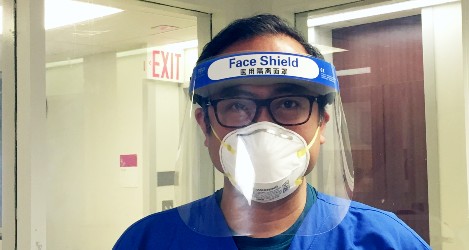Report and interview by The Graduate Center, CUNY
“I thought I was prepared as a nurse to see a death on the floor. But doing a shift witnessing several deaths is overwhelming,” says Fernand A. De Los Reyes. He is a Ph.D candidate in nursing studies at The Graduate Center of the City University of New York. De Los Reyes works full time as a staff nurse caring for COVID-19 patients at Mount Sinai Morningside hospital in Manhattan and teaches three evenings a week at Eastwick College in New Jersey.

He adds: “I am praying that those who protest for immediate opening will not end up in the Thermo King tractor trailer for dead bodies parked behind our hospital.” Last month, he battled COVID-19 himself. Now that he has recovered and is back at work, he is going through the screening process to donate plasma. De Los Reyes recently spoke to a Graduate Center interviewer about the disease, which he fears some people eager to restart the economy might be underestimating.
GC CUNY: You’ve had coronavirus yourself. What were your symptoms?
De Los Reyes: I must admit that early in the onset of COVID symptoms, scary thoughts rushed into my mind. I actually reviewed my life insurance to make sure that our mortgage would be covered, just in case.
My symptoms started on April 4th, and I got back to work on the 19th. The fever was really awful. The congestion was so bad. I lost my sense of taste. I haven’t been sick for so many years; I always get flu shots. I thought I was blessed to have COVID-19 symptoms that did not require hospitalization. I’m thankful that I didn’t have shortness of breath.
Given my recovery and detection of antibodies, I know that I have to share whatever I can. I need to continue to report to my nursing duties each shift. I know I need to keep going, so that others will keep on living.
GC: What was it like to come back to work after being so sick?
De Los Reyes: When I got back, I worked two shifts on the COVID floor. I thought I was prepared, as a nurse, to see a death on the floor. But doing a shift witnessing several deaths is just so disheartening and overwhelming. The situation is further compounded when you learn that your co-workers have passed. My former manager, who moved to another hospital, died from COVID. And my co-worker’s husband died from COVID complications.
I am praying that those who protest for immediate opening will not end up in the Thermo King tractor trailer for dead bodies parked behind our hospital.
I work as a psychiatric nurse. We’re primarily trained to deal with adverse life events, so we can serve as a resource to colleagues who need some comfort. But we need some self-care ourselves, so we don’t get too stressed out. It’s good that our hospital has a support system in place: There are psychiatrists and psychologists who are available to be with staff who are dealing with the loss of family members and of colleagues.
GC: Has your training as a student helped you manage the challenges of your current position?
De Los Reyes: Definitely. The training I had at The Graduate Center has made my thinking sharper. I search for evidence-based protocols to keep infection at bay and nurture our patients to wellness. The Roy Adaptation Model that I am studying more closely enables me, as well, to cope and adapt to adverse life events. Likewise, what I’ve learned is driving me to address health inequities among the vulnerable population stricken by the coronavirus.
GC: We seem to be entering a new stage of dealing with the pandemic. What are your hopes and fears?
De Los Reyes: What bothers me is the sight of people rushing to open their cities. People don’t realize that the invisible enemy strikes each person differently. I bet nobody wants to be alone in the ICU or to experience an up-and-down fever, shortness of breath, body aches, congestions, dry cough, and loss of the sense of taste. I am praying that those who protest for immediate opening will not end up in the Thermo King tractor trailer for dead bodies parked behind our hospital.
I’m so thankful that nurses get so much support from the community in New York City. At work, there are care packages. In yards, you see signs thanking first responders and health care workers. We appreciate that so much. But instead of giving discounts to nurses, I think companies and corporations should donate to food pantries instead. Given the enormous job loss and school closures, there are people lining up for food. Our food banks need a lot of help and support.





A Salute to Fernand A. De Los Reyes, and a thank you to Jan Herman for posting this information.
We MUST open up the country as soon as possible. Do you know what life will be like with 30% unemployment and a money starved, collapsing government? We already know social programs will have to be cut; the more we wait– the harsher life will become. That’s deadly too. Stop the –you better not do this– pronouncements. It does not help. Focus on opening up society, and doing it in the safest way we can.